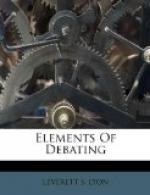There is South Dakota, for example, where under the initiative the ballot which I hold in my hand was submitted to the people at the recent election. This ballot is 7 feet long and 14 inches wide, and it is crowded with reading matter set in nonpareil type. Upon this ballot there are submitted for the consideration of the people six legislative propositions. Four of them are short and comparatively simple. But here is one referring to the people a law which has been passed at the preceding session of the legislature dividing the state into congressional districts. How many of the voters of South Dakota do you suppose got down their maps and their census reports and carefully worked out the details of that law to satisfy themselves whether or not it provided for a fair and honest districting of the state? They could not amend it, remember, they had to take it as it was or vote it down. In point of fact, they voted it down; but who will say that in doing this they expressed an enlightened judgment or merely followed the natural conservative instinct to vote “no” on a proposition they did not understand? And here is a law to provide for the organization, maintenance, equipment, and regulation of the National Guard of the state. This bill contains 76 sections. It occupies 4 feet 4 inches of this 7-foot ballot. It would fill two pages of an ordinary newspaper.
And here is a copy of the Oregon ballot, from which it appears that the stricken people of that commonwealth were called upon at the late election to consider 32 legislative propositions. Small wonder that it was well onto a month after election before the returns were all in.
And here is another constitutional amendment in which the people are asked to pass judgment on such simple propositions as providing for verdict by three-fourths of jury in civil cases, authorizing grand juries to be summoned separately from the trial jury, permitting change of judicial system by statute prohibiting retrial where there is any evidence to support the verdict, providing for affirmance of judgment on appeal notwithstanding error committed in lower court and directing the Supreme Court to enter such judgment as should have been entered in the lower court, fixing terms of Supreme Court, providing that judges of all courts be elected for six years, subject to recall, and increasing the jurisdiction of the Supreme Court. Is it any wonder that with questions such as those thrust at them so large a percentage of the voters took to the “continuous woods where rolls the Oregon” and refused to express a judgment one way or the other? Now, with all possible deference to the intelligence and the diligence of the good people of Oregon, is it conceivable that any considerable proportion of the voters of that commonwealth went to the polls with even a cursory knowledge of all the measures submitted for their determination?




